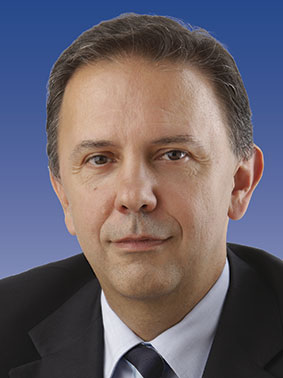
The European Union is busy with answering the question of how to make the trilemma work: ensuring the balance between supply, sustainability and affordability. Before the endless debate arrives at the correct answer, the question gradually loses its importance. New dimensions enter the equation: the rapid change in technology, the amount of investment made in battery technology, electric cars, urbanization, new generation, social media etc., just to mention a few. We interviewed Péter Kiss to get his vision on developments in the power sector for the next decades.
A couple of years ago the only potential scenario was to foresee one or two vertically integrated monopolies dominating the European power market. Economies of scale, efficiency while still being a competitive market and a heavy Russian influence describe the picture that most of us had in mind. Major events occurred which were previously completely unimaginable: energy prices could fall by 50% and not just grow by 10% every year, a drop in consumption, Fukushima and an oil price collapse.
Why do you think the power sector will lose its current position?
The current trend is that power companies have already started to clean up their portfolio of activities:
- separating their customer focus activities such as distribution, distributed energy or clean energy from the traditional conventional generation,
- carving out and selling the high carbon intensive power generation.
The traditional power generation will remain in the so-called power sector. The customer centric clean, distributed energy will completely transform itself and will become a so-called smart home business.
What will the smart home business look like?
The first thing that customers want is to control their energy demand i.e. to generate their own consumption. This is already happening, since there is already a wide choice for generating the household’s heat energy demand: households can chose from natural gas, heating oil and coal, but they can of course also opt for more sustainable energy such as pure electricity (renewable), solar panels, woodchips, heat pumps, to name but a few. In addition, customers would like to control their houses remotely: including heating, lighting and a lot of automated functions such a drinking water production. Due to this customers will not look at the power sector as a single supplier, but rather as a service provider to whom they can sell their excess power production and buy from in case of shortage.
But what is going to happen to the so-called traditional power sector?
Obviously, centralized power generation will still have a role in the future. Base load power plants are necessary to meet high volume constant demand: the demand of industrial and commercial customers. But this will be more a business to business transaction.
Can you imagine that one single service provider will be in touch with the end users?
It does not matter how many service providers will exist in the background. But all the smart home services may be bundled together such as via the applications on a smart phone: you can order and pay various services through a single device, you can control your home temperature with an app, you can pay all of your bills and order various services.
What will be the impact of all these changes on the power companies?
The power companies are currently under serious pressure. They have only one chance, to recognize how to leverage their core skills and how to rapidly move forward. All these trends are working against them. They are neither innovative nor customer centric enough. They are currently in a losing position. This does not necessarily mean that some of them do not currently generate enough money for one reason or another. But their position is not sustainable. This is reality. We can list many examples of big companies that have disappeared because of new technology, new entrants to the market or changing customer preferences. These trends are now reaching the traditional power sector.
This may only be one potential scenario of the many possible ones that you describe?
This is true. Nobody knows what the exact situation will be in 15 years. But you need to have a vision about the big picture, i.e. to have scenarios. You need to have a good understanding of trends such as the advancement of technology, e.g. the price of battery driven, solar panel and electric cars. And in the meantime, unexpected events may have a major influence on the future, such as discoveries on Mars, large scale availability of superconductors, unexpected demographic changes and successful challenges to the basic laws of physics.
What does all this mean for a professional services provider such as for KPMG?
Change is a paradise for us. Change translates into a lot of challenges for all of the stakeholders such as owners, customers, suppliers but especially for the management. Such a change is a challenge for the management but is everyday business for us. We provide services to all of those sectors that have completely transformed recently, for example, financial and telco consumer goods, just to mention two. Strategy, transformation, customer relationship management, tax efficient supply chain, HR services to highlight the most relevant offerings. We constantly recruit the best professionals from industry, the best talents from universities and make strategic acquisitions. In the meantime, KPMG will also transform from its audit backboned business into an implementation house of breakthrough ideas. We are in the short term a cash business: if we are not relevant to our clients today, they will not engage us tomorrow.
There are many professional services providers? Why KPMG?
We are passionate about what we do. Passion brings creativity. Creativity attracts the client’s attention. We love working with our clients. And this will deliver results. Clients see and feel it. We have just recently held our flagship client event in Madrid. The KPMG 2015 Global Power and Utilities Conference welcomed 250 people from 30 countries for two days to discuss the current issues of the industry. It was a great experience for everybody, we are close to each other professionally and personally. Our clients’ success is our success.
Péter Kiss is a partner at KPMG serving power clients in the Nordic region. Prior to that, he acted as Global Head of Power and Utilities between 2008 and 2014.



